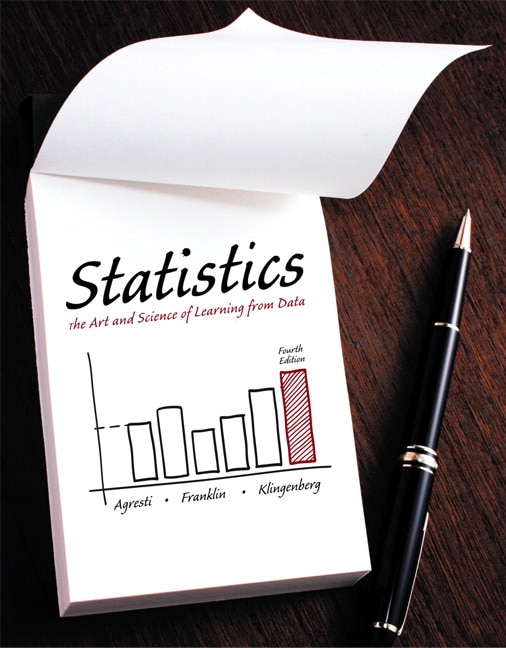
45.00$
Test Banks & Solution Manual
- Test Banks for Textbooks. Save money on TEST BANKS
- Anticipate the type of the questions that will appear in your exam.
- Delivery is INSTANT. You can download the files IMMEDIATELY once payment is done.
- Our test banks can help! All test banks are Downloads-take them with you to study!
- YOU GET ALL OF THE CHAPTERS. Each Test Bank follows your textbook.
- Ace Your Exams with Us! We are Students Helping Students Pass.
- Customer Service 24/7
Category : Higher Education
Preface PART ONE: GATHERING AND EXPLORING DATA 1. Statistics: The Art and Science of Learning from Data 1.1 Using Data to Answer Statistical Questions 1.2 Sample Versus Population 1.3 Using Calculators and Computers Chapter Summary Chapter Problems 2. Exploring Data with Graphs and Numerical Summaries 2.1 Different Types of Data 2.2 Graphical Summaries of Data 2.3 Measuring the Center of Quantitative Data 2.4 Measuring the Variability of Quantitative Data 2.5 Using Measures of Position to Describe Variability 2.6 Recognizing and Avoiding Misuses of Graphical Summaries Chapter Summary Chapter Problems 3. Association: Contingency, Correlation, and Regression 3.1 The Association Between Two Categorical Variables 3.2 The Association Between Two Quantitative Variables 3.3 Predicting the Outcome of a Variable 3.4 Cautions in Analyzing Associations Chapter Summary Chapter Problems 4. Gathering Data 4.1 Experimental and Observational Studies 4.2 Good and Poor Ways to Sample 4.3 Good and Poor Ways to Experiment 4.4 Other Ways to Conduct Experimental and Nonexperimental Studies Chapter Summary Chapter Problems Part Review 1 (ONLINE) PART TWO: PROBABILITY, PROBABILITY DISTRIBUTIONS, AND SAMPLING DISTRIBUTIONS 5. Probability in Our Daily Lives 5.1 How Probability Quantifies Randomness 5.2 Finding Probabilities 5.3 Conditional Probability 5.4 Applying the Probability Rules Chapter Summary Chapter Problems 6. Probability Distributions 6.1 Summarizing Possible Outcomes and Their Probabilities 6.2 Probabilities for Bell-Shaped Distributions 6.3 Probabilities When Each Observation Has Two Possible Outcomes Chapter Summary Chapter Problems 7. Sampling Distributions 7.1 How Sample Proportions Vary Around the Population Proportion 7.2 How Sample Means Vary Around the Population Mean Chapter Summary Chapter Problems Part Review 2 (ONLINE) PART THREE: INFERENTIAL STATISTICS 8. Statistical Inference: Confidence Intervals 8.1 Point and Interval Estimates of Population Parameters 8.2 Constructing a Confidence Interval to Estimate a Population Proportion 8.3 Constructing a Confidence Interval to Estimate a Population Mean 8.4 Choosing the Sample Size for a Study 8.5 Using Computers to Make New Estimation Methods Possible Chapter Summary Chapter Problems 9. Statistical Inference: Significance Tests About Hypotheses 9.1 Steps for Performing a Significance Test 9.2 Significance Tests About Proportions 9.3 Significance Tests About Means 9.4 Decisions and Types of Errors in Significance Tests 9.5 Limitations of Significance Tests 9.6 The Likelihood of a Type II Error Chapter Summary Chapter Problems 10. Comparing Two Groups 10.1 Categorical Response: Comparing Two Proportions 10.2 Quantitative Response: Comparing Two Means 10.3 Other Ways of Comparing Means and Comparing Proportions 10.4 Analyzing Dependent Samples 10.5 Adjusting for the Effects of Other Variables Chapter Summary Chapter Problems Part Review 3 (ONLINE) PART FOUR: ANALYZING ASSOCIATION AND EXTENDED STATISTICAL METHODS 11. Analyzing the Association Between Categorical Variables 11.1 Independence and Dependence (Association) 11.2 Testing Categorical Variables for Independence 11.3 Determining the Strength of the Association 11.4 Using Residuals to Reveal the Pattern of Association 11.5 Fisher’s Exact and Permutation Tests Chapter Summary Chapter Problems 12. Analyzing the Association Between Quantitative Variables: Regression Analysis 12.1 Modeling How Two Variables Are Related 12.2 Inference About Model Parameters and the Association 12.3 Describing the Strength of Association 12.4 How the Data Vary Around the Regression Line 12.5 Exponential Regression: A Model for Nonlinearity Chapter Summary Chapter Problems 13. Multiple Regression 13.1 Using Several Variables to Predict a Response 13.2 Extending the Correlation and R2 for Multiple Regression 13.3 Using Multiple Regression to Make Inferences 13.4 Checking a Regression Model Using Residual Plots 13.5 Regression and Categorical Predictors 13.6 Modeling a Categorical Response Chapter Summary Chapter Problems 14. Comparing Groups: Analysis of Variance Methods 14.1 One-Way ANOVA: Comparing Several Means 14.2 Estimating Differences in Groups for a Single Factor 14.3 Two-Way ANOVA Chapter Summary Chapter Problems 15. Nonparametric Statistics 15.1 Compare Two Groups by Ranking 15.2 Nonparametric Methods for Several Groups and for Matched Pairs Chapter Summary Chapter Problems Part Review 4 (ONLINE) Tables Answers Index Index of Applications Table of Contents
What is Test Bank?
The test bank is a guide for testing and exams. It contains a lot of questions with their correct answers related to an academic textbook. Test banks usually contain true/false questions, multiple choice questions, and essay questions. Authors provide those guides to help instructors and teachers create their exams and tests easily and fast. We recommend all students to download the sample attached to each test bank page and review them deeply..
What is Solutions Manual?
The solutions manual is a guide where you can find all the correct answers (odd and even) to your textbooks’ questions, cases, and problems.
Can I get a sample before buying a Test Bank or Solutions Manual?
Samples are attached to each test bank and solutions manual page at our website. We always recommend students and instructors to download the samples before placing orders. At MANUALS1 we offer a complete sample chapter for each product.
Can I download my files immediately after completing the order?
Yes. Our system will grant you an access to download your files immediately after completing the order.
How will I download my product?
You will receive an email from testbanky that contains the download link.
If you could not download your product for any reason, contact us and we will solve the issue immediately.
No comments:
Post a Comment